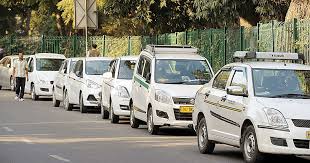In Goa, a cab conundrum: Taxi operators raise the heat, govt urges them to join state-backed apps

Goa, known for its beautiful beaches, vibrant nightlife, and thriving tourism industry, is currently facing a significant challenge in its local transportation sector. Traditional taxi operators, who have long been the backbone of travel for residents and tourists alike, are raising their voices amid rising competition from private app-based aggregators. This has led to increased friction between taxi unions and the government, which is now encouraging operators to transition to state-backed digital platforms to modernize the sector and ensure fair play.
Traditional Taxi Operators Feeling the Squeeze
The advent of app-based ride services like Ola and Uber has transformed the way people commute across India, including popular tourist destinations like Goa. However, this digital disruption has not come without its controversies. Many traditional taxi drivers in Goa claim they are struggling to compete with private aggregators, which they accuse of flouting regulations and undercutting fares.
These operators argue that while they must follow strict government rules regarding licensing, fare structure, and vehicle maintenance, many private app-based drivers operate without proper authorization or pay the necessary fees. This discrepancy, according to taxi unions, creates unfair competition that threatens their livelihoods.
“The app drivers don’t follow the rules, and that hurts us,” said Ramesh Naik, a senior leader of one of Goa’s taxi unions. “We have to bear the cost of permits, insurance, and government taxes, but these private aggregators ignore these responsibilities and charge cheaper fares. It is killing our business.”
In recent months, this frustration has boiled over into protests and public demonstrations, with taxi operators demanding stronger government intervention to regulate private aggregators and protect their interests.
Government’s Vision: Digitize and Regulate
The Goa government recognizes the valid concerns of taxi operators but views digitization as an inevitable and beneficial step for the transportation ecosystem. To address the sector’s challenges, the government has developed and promoted state-backed ride-hailing apps designed specifically for licensed taxi operators.
These government-approved platforms aim to level the playing field by offering a controlled environment where fares, driver credentials, and vehicle conditions are strictly monitored. Unlike private aggregators, these state-backed apps work closely with government agencies to ensure compliance with all relevant regulations.
“The goal is to bring transparency and reliability to the taxi sector,” said an official from Goa’s Transport Department. “By joining the state-backed app, taxi operators can reach a larger customer base while maintaining fair fares and safety standards.”
Advantages of Joining State-Backed Apps
The state-backed apps provide several advantages to traditional taxi operators that can help them compete more effectively in today’s digital marketplace:
- Regulated Fare System: Operators can rely on a government-approved fare structure, reducing the risk of price undercutting.
- Safety and Accountability: Real-time GPS tracking and verified driver profiles enhance passenger security.
- Cashless Transactions: Secure digital payments reduce the risks and inconvenience of cash handling.
- Customer Trust: Official platforms backed by the government inspire greater confidence among tourists and locals.
The government has also committed to offering training programs and technical support to help taxi drivers familiarize themselves with smartphone usage and app operations.
Challenges for Taxi Operators
Despite these benefits, many taxi drivers remain hesitant or skeptical about switching to digital platforms. A large proportion of Goa’s taxi operators are middle-aged or older individuals with limited experience using smartphones or digital technology. For many, the fear of losing control over their business or being forced to pay high commissions to app operators is a significant barrier.
Additionally, there are concerns over affordability. Many taxi drivers operate on thin margins and worry that the cost of smartphones, internet data, and platform fees could further reduce their already low earnings.
“We want to survive, but technology is difficult for many of us,” explained Maria Fernandes, a female taxi operator from Panaji. “We don’t have the money to buy expensive phones or pay monthly commissions. The government should help us more.”
Experts Suggest a Balanced Approach
Transportation experts believe that the solution lies in balancing technology adoption with socio-economic realities. Subsidies for smartphones and data plans, along with low or zero commission rates for a transitional period, could encourage more operators to join the official digital platforms.
Moreover, consistent enforcement of licensing and fare rules on all taxi operators, including private app-based drivers, is necessary to ensure fairness. Regulators should act firmly against illegal or unlicensed ride providers to protect both consumers and legitimate taxi operators.
“Modernizing the sector is essential, but it must be inclusive,” said Dr. Anil Deshmukh, a transport policy analyst. “Capacity-building and financial support can ease the transition for traditional taxi drivers. At the same time, there must be strict oversight to prevent rule-breaking by any party.”
Impact on Goa’s Tourism Industry
As Goa prepares for another busy tourist season, the taxi dispute has caught the attention of the tourism industry as well. Reliable and safe transportation is a key factor in visitor satisfaction, and a fragmented taxi sector could harm Goa’s image as a tourist-friendly destination.
Travel agencies and hotels have voiced support for a unified, regulated taxi network that leverages technology without sidelining local operators. “Tourists expect convenience, safety, and transparency,” said Anjali Rao, a hotel manager in Calangute. “A government-backed app system can deliver that while helping local taxi drivers sustain their businesses.”
Looking Ahead: A Collaborative Future
The ongoing cab conundrum in Goa highlights the complex challenges faced by many regions balancing tradition with modernization. The government’s efforts to digitize the taxi sector through state-backed apps offer a promising path, but success depends on cooperation between authorities, taxi operators, and technology providers.
With adequate support and fair policies, Goa can transform its taxi industry into a model of inclusivity and innovation — one that preserves livelihoods while meeting the demands of a new digital era.






